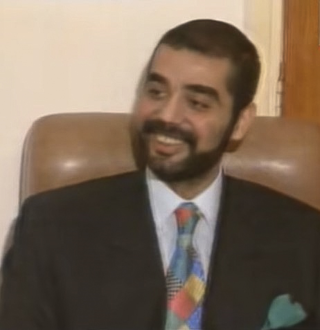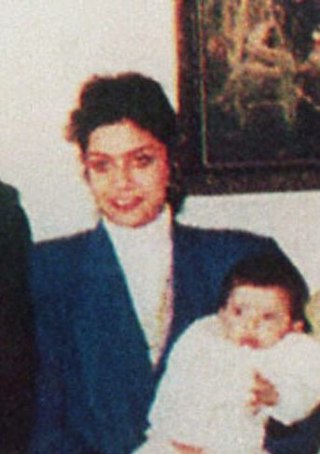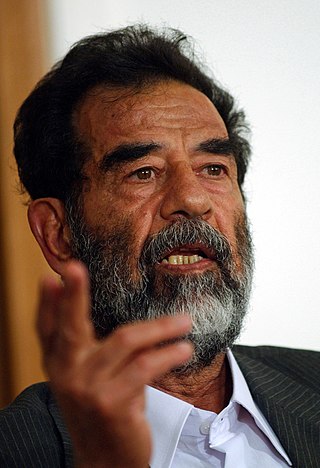This article may require cleanup to meet Wikipedia's quality standards. The specific problem is: Missing section dividers and infobox.(May 2024) |
Khalil al-Duleimi is an Iraqi attorney best known for representing Saddam Hussein at his trial.
This article may require cleanup to meet Wikipedia's quality standards. The specific problem is: Missing section dividers and infobox.(May 2024) |
Khalil al-Duleimi is an Iraqi attorney best known for representing Saddam Hussein at his trial.
He was one of 22 lawyers representing Hussein at his trial, and the only one based in Iraq. When Saddam's legal team learned that Saddam was to be interrogated, they requested the presence of a lawyer. Al-Duleimi represented Saddam, and told the head of the legal team, Jordan-based lawyer Ziad al-Khasawneh, that Saddam had answered the tribunal with "confidence and serenity". Al-Duleimi has spent significant time in hiding since his meeting with Saddam, as he received numerous death threats, including a message to his home warning that suicide cells had been formed specifically to kill him as an example to all other attorneys who had volunteered for Saddam's defense team. In May 2005, upon release of photos showing Saddam sleeping and washing his trousers, by an anonymous US Army officer, al-Duleimi made comments critical of the United States Army, but did not comment on a possible lawsuit proposed by al-Khasawneh.
On August 8, 2005, Saddam's family dissolved the remainder of the legal team and appointed al-Duleimi as sole legal counsel. [1]
In a June 2006 interview with Malcolm Beith of Newsweek, al-Duleimi announced his intention to write a book about his client, in which he would "tell the truth." "My memoirs will contain all the facts, and I will reveal many details that will serve justice and the truth," he told the Newsweek reporter. In February 2007, al-Duleimi officially re-iterated those plans to write a book about the "many secrets" his client Saddam Hussein revealed to him during their 140 interviews. The secrets are purportedly about the fall of Baghdad and Saddam's imprisonment. Al-Duleimi also promised to reprint as many as 300 personal letters, poems and other miscellaneous works written by Saddam. The book, according to al-Duleimi, could be out in as little as one year. At the time of his announcement, al-Duleimi had not yet found a publisher. [2]
In December 2008, Muntadhar al-Zaidi, an Iraqi broadcast journalist who was under detention for throwing his shoes at U.S. president George W. Bush on December 14, 2008, refused al-Duleimi's offer to defend him legally. [3]

Uday Saddam Hussein was an Iraqi politician, and the elder son of Saddam Hussein. He held numerous positions as a sports chairman, military officer and businessman, and was the head of the Iraqi Olympic Committee, Iraq Football Association, and the Fedayeen Saddam.

Tariq Aziz was an Iraqi Assyrian politician who served as Deputy Prime Minister (1979–2003), Minister of Foreign Affairs (1983–1991) and a close advisor of President Saddam Hussein. Their association began in the 1950s when both were activists for the then-banned Arab Socialist Ba'ath Party. He was both an Arab nationalist and a member of the Chaldean Catholic Church.

Under the Arab Socialist Ba'ath Party, Iraq's human rights record was considered one of the worst in the world. Secret police, state terrorism, torture, mass murder, genocide, ethnic cleansing, rape, deportations, extrajudicial killings, forced disappearances, assassinations, chemical warfare, and the destruction of the Mesopotamian marshes were some of the methods Saddam Hussein and the country's Ba'athist government used to maintain control. Saddam committed crimes of aggression during the Iran–Iraq War and the Gulf War, which violated the Charter of the United Nations. The total number of deaths and disappearances related to repression during this period is unknown, but is estimated to be at least 250,000 to 290,000 according to Human Rights Watch, with the great majority of those occurring as a result of the Anfal genocide in 1988 and the suppression of the uprisings in Iraq in 1991. Human Rights Watch and Amnesty International issued regular reports of widespread imprisonment and torture.

Sajida Khairallah Talfah is the widow of former Iraqi President Saddam Hussein, and mother of two sons and three daughters with him. She is the oldest daughter of Khairallah Talfah, her husband's maternal uncle.

Izzat Ibrahim al-Douri was an Iraqi politician and army field marshal. He served as Vice Chairman of the Iraqi Revolutionary Command Council until the 2003 U.S. invasion of Iraq and was regarded as the closest advisor and deputy under President Saddam Hussein. He led the Iraqi resistance group Naqshbandi Army.

Colonel General Hussein Kamel Hassan al-Majid was an Iraqi military officer and the son-in-law and first cousin once removed of former Iraqi president Saddam Hussein. He defected to Jordan and assisted United Nations Special Commission (UNSCOM) and International Atomic Energy Agency (IAEA) inspection teams assigned to look for weapons of mass destruction in Iraq. He was killed the following year for betraying Saddam.

Raghad Saddam Hussein is an Iraqi in exile and the eldest daughter of former Iraqi ruler Saddam Hussein.

The Saddam Hussein and al-Qaeda link allegations were based on false claims by the United States government alleging that a secretive relationship existed between Iraqi president Saddam Hussein and the Sunni pan-Islamist militant organization al-Qaeda between 1992 and 2003. U.S. president George W. Bush used it as a main reason for invading Iraq in 2003.
Ziyad Al-Khasawneh is a Jordanian lawyer who headed a team of over 3000 defense lawyers for former Iraqi President Saddam Hussein. He resigned as head of the defense team on July 7, 2005, after a dispute with Saddam Hussein's daughter, Raghad.

The trial of Saddam Hussein was the trial of the deposed President of Iraq Saddam Hussein by the Iraqi Interim Government for crimes against humanity during his time in office.
The Emergency Committee for Iraq was formed by Ramsey Clark, Roland Dumas, Ahmed Ben Bella and Tun Mahathir Mohamad all former senior politicians, to strive to encourage respect for the rule of law in Iraq.

The execution of former Iraqi president Saddam Hussein took place on 30 December 2006. Saddam was sentenced to death by hanging, after being convicted of crimes against humanity by the Iraqi Special Tribunal for the Dujail massacre—the killing of 148 Iraqi Shi'ites in the town of Dujail—in 1982, in retaliation for an assassination attempt against him.

Giovanni Di Stefano is an Italian-British businessman and convicted fraudster. He has been involved in legal cases for high-profile and notorious defendants worldwide. He has no legal qualifications, is barred from working in law in the UK, and is not registered to work as an advocate in the UK or Italy. He has been referred to as "The Devil's Advocate" for his advocacy on behalf of such notorious clients as Saddam Hussein and Slobodan Milošević. He was also a business associate of Željko Ražnatović, a Serbian paramilitary leader and indicted war criminal.
The Habbush letter, or Habbush memo, is a handwritten message dated July 1, 2001, which appears to show a link between al-Qaeda and Iraq's government. It purports to be a direct communication between the head of Iraqi Intelligence, General Tahir Jalil Habbush al-Tikriti, to Iraqi president Saddam Hussein, outlining mission training which Mohamed Atta, one of the organizers of the September 11 attacks, supposedly received in Iraq. The letter also claims that Hussein accepted a shipment from Niger, an apparent reference to an alleged uranium acquisition attempt that U.S. President George W. Bush cited in his January 2003 State of the Union address.

Muntadhar al-Zaidi is an Iraqi broadcast journalist who served as a correspondent for Iraqi-owned, Egyptian-based Al-Baghdadia TV. As of February 2011, al-Zaidi works with a Lebanese TV channel.
Dheyaa al-Saadi is an Iraqi lawyer. As leader of the Iraqi Bar Association, he protested against the Iraqi government's dissolution of the association's elected council in March 2006. In December 2008, he became the head of the legal team chosen by al-Baghdadia TV to defend Muntadhar al-Zaidi, an Iraqi broadcast journalist working for al-Baghdadia who was detained for throwing his shoes at U.S. president George W. Bush on December 14, 2008.
The Iraqi Bar Association, created in 1933, is the biggest lawyers' association in Iraq, with tens of thousands of members as of 2007. It is a member of the International Bar Association.

The interrogation of Saddam Hussein began shortly after his capture by U.S. forces in December 2003, while the deposed president of Iraq was held at the Camp Cropper detention facility at Baghdad International Airport. Beginning in February 2004, the interrogation program, codenamed Operation Desert Spider, was controlled by Federal Bureau of Investigation (FBI) agents. Standard FBI FD-302 forms filed at the time were declassified and released in 2009 under a U.S. Freedom of Information Act request filed by the National Security Archive. Saddam, identified as "High Value Detainee #1" in the documents, was the subject of 20 "formal interviews" followed by five "casual conversations." Questioning covered the span of Saddam's political career, from 2003 when he was found hiding in a "spider hole" on a farm near his home town of Tikrit, back to his role in a failed 1959 coup attempt in Iraq, after which he had taken refuge in the very same place, one report noted.
Hussein Mjalli was a Jordanian politician and lawyer. He was a member of the House of Representatives from 1989 until 1993. He served as President of the Jordanian Bar Association for several terms. After the capture of Saddam Hussein in Iraq, he joined his defence team, while still President of the Jordanian Bar Association. In 2011 he joined the government of Prime Minister Marouf al-Bakhit as Minister of Justice. He resigned the same year.

On 14 December 2008, Iraqi journalist Muntadhar al-Zaidi removed his shoes and threw them at United States president George W. Bush during a joint press conference with Iraqi prime minister Nouri al-Maliki in Baghdad, Iraq. Bush quickly ducked, avoiding being hit by either of the shoes. The second shoe collided with a U.S. flag positioned behind Bush. Al-Zaidi was subsequently grabbed, kicked, and removed from the room by security.